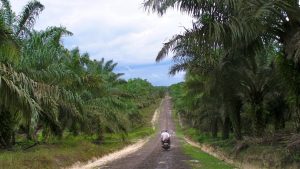The Indonesian parliament gambled that its hasty approval of a controversial economic stimulus plan on October 5 would effectively mitigate public anger about its problematic labor and environmental provisions.
It clearly miscalculated.
Instead, thousands of Indonesian citizens across the archipelago have taken to the streets in mass protest over the economic stimulus “Omnibus Law’s” substance, its multiple procedural flaws and the absence of meaningful public consultation on its implications.
Indonesian legislators and the government of President Joko “Jokowi” Widodo pitched the new law – which involved the insertion of 174 new articles into 79 existing laws governing areas including taxation, labor, investment and the environment – as an essential job-creating antidote to the country’s pandemic-induced economic slump. The cost of that stimulus? Long-term environmental damage that will sabotage the economic gains of the agribusiness sector’s tentative moves toward sustainability
The new law has provisions that remove legal protections for primary forest cover, raising the risk of massive deforestation. It loosens requirements for environmental impact assessments for industrial and agribusiness projects and empowers the central government to approve business and investment in officially designated forest and peatland areas, which are currently protected by a moratorium on deforestation. The law also eliminates the legal requirement that provinces maintain a minimum forest cover of 30 percent on provincial land by allowing them to set such standards “proportionately.” And it raises the regional risk of catastrophic haze from plantation fires by lifting the existing strict legal liability for companies with fires occurring on their concession areas. An analysis of these provisions by the Indonesian think tank Madani underscores their potentially disastrous impacts, including the complete destruction of natural forest cover in the provinces of Riau, Jambi, South Sumatra, Bangka Belitung and Central Java over the next three decades.
The law’s pro-deforestation elements aren’t just a clear and present danger to Indonesia’s remaining rainforests. They directly contradict the Jokowi government’s explicit embrace of a “green growth” economic development model premised on “healthier, more productive ecosystems,” which hinges on “the belief that economic growth and environmental sustainability are not merely compatible objectives…[but] essential for the future of humankind.” Sadly, the law’s pro-deforestation elements will effectively reverse the Indonesian government’s achievements in recent years in protecting its forests. That includes the August 2010 enactment of a permanent moratorium on forest clearing for timber and plantation development that helped reduce deforestation in Indonesia in 2019 to its lowest levels in almost two decades.
The Indonesian government had powerful private sector accomplices in trading its “Green Growth” aspirations for an economic stimulus hinged to accelerated deforestation. Indonesia’s palm-oil sector, whose exports constitute more than 2 percent of Indonesia’s annual gross domestic product, either adopted a stance of complicit silence or undertook active cheerleading of the law’s passage. Joko Supriyono, Vice-President Director of Astra Agro Lestari, Indonesia’s second-largest palm-oil producer and Chairman of the Indonesian Palm Oil Producers Association (GAPKI), described GAPKI’s support for the law as essential to “the interests of the national palm oil sector.” In fact, that support effectively disavows the progress that the palm oil sector – Astra included – has made in recent years to expunge its well-earned reputation as a major driver of forest destruction by implementing “No Deforestation, No Peatland, No Exploitation” (NDPE) policies.
But the Indonesian government and the rogue elements of the country’s palm oil sector have misinterpreted unfettered exploitation of forests as a reliable economic growth driver. Instead, the pro-deforestation provisions of the new law are likely to stigmatize Indonesia among investors and importers increasingly conscious of environmental sustainability standards. In July, a coalition of Indonesian environmental and civil society groups warned in a public letter to domestic and international financiers that the bill’s passage would mean that “Indonesian current laws and regulations will no longer comply with globally accepted environmental and social safeguards.” That same month, the World Bank’s Indonesia and Timor-Leste country director, Satu Kahkonen, cautioned that the Omnibus Bill would “move Indonesia’s environmental legislation further away from the implementation of best practices.” Those warnings appear prophetic. On October 5, a grouping of global investors managing $4.1 trillion in assets issued a letter to the Indonesian government stating their concerns about “the negative impact of certain environmental protection measures affected by the Omnibus Bill.”
Indonesia’s palm oil sector is particularly vulnerable to blowback from importers due to the new law’s problematic environmental provisions. Major palm oil importers including the European Union and United Kingdom are considering increasingly more stringent environmental standards for agricultural imports, including palm oil. And it’s not only governments demanding tighter restrictions on imports linked to deforestation. On October 5, a grouping of 21 international firms including McDonald’s, Nestlé, Tesco and Unilever issued a statement urging the U.K. government to extend its proposed anti-deforestation agricultural import legislation to include commodities produced as a result of both legal and illegal deforestation. The companies argued that “restricting action to illegal deforestation would not achieve halting the loss of natural ecosystems, especially when governments have discretion to decide what is legal.”
The Indonesian government has made a profound strategic error by applying a mid-20th century economic problem-solving template premised on ruthless environmental exploitation for economic gain to a 21st-century economic reality that is increasingly geared to economic sustainability principles. The government can address that error by formulating the new law’s specific implementing regulations in close consultation with environmental and civil society organizations to mitigate its malign implications for the country’s forests. And the private sector – particularly palm oil firms – should refrain from taking advantage of the lower environmental standards embodied in the new law and instead reaffirm and strictly enforce NDPE policies. Failure to do so may well condemn Indonesia to become the Brazil of Asia – a country that knowingly trades away its environmental treasures for the ashes and haze of self-destructive short-term economic growth.
Phelim Kine is senior director for Asia at the Washington, D.C.-based environmental campaign organization Mighty Earth and a former Jakarta bureau chief for Dow Jones Newswires.

































